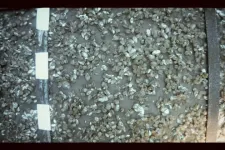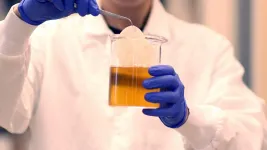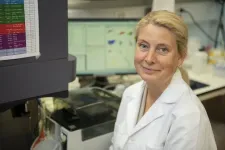Invasive mussels now control a key nutrient in the American Great Lakes
The spread of quagga mussels across the American Great Lakes has transformed the supply of phosphorus - a key biological nutrient - to the ecosystem, according to research published this week in PNAS
2021-01-26
(Press-News.org) The health of aquatic ecosystems depends on the supply of key nutrients, especially phosphorus. Too much phosphorus results in unwanted eutrophication, and much effort is spent on preventing phosphorus pollution of water bodies. In the World's largest freshwater ecosystem, the North American Great Lakes, this control may have recently been lost to an invasive species. According to a new study, quagga mussels, which have spread across four of the five Great Lakes, have accumulated large amounts of phosphorus in their biomass, to the degree that their activities now regulate the supply of phosphorus to the ecosystem.
The invaders, native to the Ponto-Caspian region of Eurasia, appeared in the Great Lakes in the late 1980's and by late 2000's spread over vast areas of bottom sediments in all the lakes except Lake Superior. Their biological effects on the ecosystem have been well recognized, but effects on the chemical system remained uncertain.
Researchers from the Large Lakes Observatory, University of Minnesota Duluth analyzed the cycling of phosphorus in lakes Michigan, Huron, Erie, and Ontario. They used a mass-balance model, which they calibrated with measurements that the team performed on sediments and mussels at multiple locations in Lakes Michigan and Huron. The results show that the concentrations of phosphorus in the invaded Great Lakes are now regulated by the population dynamics of a single benthic species, the quagga mussel.
"Quagga mussels are small, hard-shelled organisms that live on the lake floor and filter the water, removing the phytoplankton and other small particles," explains Ted Ozersky, an Associate Professor of Biology who co-led the study. By now they occupy the lake floor at densities often exceeding 10,000 individuals per square meter (6 mussels per square inch). "In terms of biomass, quagga mussels are the dominant life form in the Great Lakes," says Sergei Katsev, a Professor at the Large Lakes Observatory who oversaw the geochemical aspects of the research.
By filtering organic particles from the lake water and recycling phosphorus back with their excretions and feces, mussels dramatically alter the natural rates at which phosphorus is exchanged between lake water and sediments. According to the study, the mussels in Lake Michigan are not only removing phosphorus from the water ten times faster than two decades ago, but are also resupplying the water column with eight times the amount of phosphorus that reaches the lake from the entire watershed. This kind of "internal loading" effectively decouples the dynamics of phosphorus from watershed inputs, leaving the system open to poorly predictable fluctuations when mussel populations increase or decrease.
"The mussels have short-circuited the normal pathways of the phosphorus cycling in the lakes," explains the lead author Jiying Li, formerly a postdoctoral researcher at UMD and presently an Assistant Professor at the Hong Kong University of Science and Technology. "And the productivity in the lakes is now tied to what the mussel populations are doing."
Growing populations of mussels are capable of absorbing large quantities of phosphorus from the water column, which is partly responsible for the water in the Great Lakes becoming clearer over recent years. In contrast, mortality events are capable of releasing large quantities of phosphorus back into the ecosystem. As a result, phosphorus becomes regulated by the dynamics of mussel populations and may respond only slowly to our efforts to control the runoff of phosphorus from the watershed.
The results of the study, which appears in this week's PNAS, show that a single invasive species can have dramatic consequences for geochemical cycles even in the world's largest aquatic ecosystems. According to the authors, this forewarns of similar ecological changes in mussel-invaded lakes across Europe and North America and calls for a new paradigm for managing aquatic ecosystems.
INFORMATION:
The study was funded by the US National Science Foundation grant OCE-1737368.
[Attachments] See images for this press release:

ELSE PRESS RELEASES FROM THIS DATE:
2021-01-26
Their field may not be top of mind among those that contribute to the greater good, yet new research from the University of Notre Dame shows marketers can help entrepreneurs in emerging markets grow their businesses, which in turn helps them to improve lives, sustain livelihoods, enhance overall living standards and strengthen societies.
"Do Marketers Matter for Entrepreneurs? Evidence from a Field Experiment in Uganda" is forthcoming in the Journal of Marketing from Frank Germann, an associate professor of marketing at Notre Dame's Mendoza College of Business who teaches ...
2021-01-26
Cell phone data that is routinely collected by telecommunications providers can reveal changes of behavior in people who are diagnosed with a flu-like illness, while also protecting their anonymity, a new study finds. The Proceedings of the National Academy of Sciences (PNAS) published the research, led by computer scientists at Emory University and based on data drawn from a 2009 outbreak of H1N1 flu in Iceland.
"To our knowledge, our project is the first major, rigorous study to individually link passively-collected cell phone metadata with actual public health data," says Ymir Vigfusson, assistant professor in Emory University's Department of Computer Science and a first author of the study. "We've shown ...
2021-01-26
WASHINGTON -- A multi-institutional group of researchers has developed new metamaterial tiles that will help improve the sensitivity of telescopes being built at the preeminent Simons Observatory in Chile. The tiles have been incorporated into receivers that will be deployed at the observatory by 2022.
The Simons Observatory is the center of an ambitious effort to measure the cosmic microwave background -- electromagnetic radiation left over from an early stage of the universe -- using some of the world's largest and most sophisticated ground-based telescopes. ...
2021-01-26
Providing economic relief to struggling families can lead to another positive effect -- fewer cases of child neglect, according to new research by the University of Washington.
A 10% increase in a common benefit for low- to moderate-income working families, the Earned Income Tax Credit, led to a 9% decrease in the annual number of reports of child neglect made to child welfare agencies over a 14-year study period. That's a significant impact, researchers say, and can inform future social policies.
The study is relevant to current policy actions, as President Joe Biden has recently proposed an expansion ...
2021-01-26
RESEARCH TRIANGLE PARK, N.C. -- Kombucha tea, a trendy fermented beverage, inspired researchers to develop a new way to generate tough, functional materials using a mixture of bacteria and yeast similar to the kombucha mother used to ferment tea.
With Army funding, using this mixture, also called a SCOBY, or symbiotic culture of bacteria and yeast, engineers at MIT and Imperial College London produced cellulose embedded with enzymes that can perform a variety of functions, such as sensing environmental pollutants and self-healing materials.
The team also showed that they could incorporate yeast directly into the cellulose, creating living materials that could be used to purify water for Soldiers in the field or make smart packaging materials that can detect damage.
"This ...
2021-01-26
COLUMBIA, Mo. - In 2016, the World Health Organization called the Zika virus epidemic a "public health emergency of international concern" due to the virus causing birth defects for pregnant women in addition to neurological problems. Since then, researchers have wrestled with different strategies for controlling the spread of Zika virus, which gets transmitted to humans from female mosquito bites.
One approach, which was approved by the Environmental Protection Agency in May, will release more than 750 million genetically modified mosquitos into the Florida Keys in 2021 and 2022. These "suicide mosquitos" are genetically-altered to produce offspring that die before emerging into adults and therefore cannot ...
2021-01-26
An international research collaboration, involving scientists from the UK, US and Spain, has shed new light on the usefulness of digital contact tracing (DCT) to control the spread of Covid-19.
The study, published today in Nature Communications, assessed the effectiveness of the Spanish DCT app, Radar COVID, following a 4-week experiment conducted in the Canary Islands, Spain between June-July 2020.
For the experiment, funded by the Secretary of State of Digitalisation and Artificial Intelligence (SEDIA), the researchers simulated a series of Covid infections in the capital of La Gomera, San Sebastián de la Gomera, to understand whether the Radar COVID app technology could ...
2021-01-26
Individual variations in how the immune system responds to SARS-CoV-2 appear to impact the severity of disease. Researchers at Karolinska Institutet in Sweden have now been able to show that patients with severe COVID-19 have significantly elevated levels of a certain type of immune cells in their blood, called myeloid-derived suppressor cells. The study published in the Journal of Clinical Investigation may bring an increased understanding of how early immune responses impact disease severity.
Most individuals with COVID-19 develop mild to moderate symptoms and recover without needing hospital treatment. In severe cases, however, COVID-19 can lead to respiratory failure or even death. It is not yet known ...
2021-01-26
Materials scientists of Far Eastern Federal University (FEFU), in collaboration with an international research team, have advanced the design of composite ceramic materials (Ce3+:YAG-Al2O3), i.e. solid-state light converters (phosphors) that can be applied in-ground and aerospace technologies. The LED systems based on the developed materials to save 20-30 percent more energy compared to commercial analogues. A related article was published in Materials Characterization.
Over 15% of the total global electricity production or about $ 450 billion annually spent on lighting. According to the photonics development roadmap run in Russia, the development of LED technology with an efficiency of more than 150 ...
2021-01-26
Canada could be sitting on a significant untapped resource, as the number of PhD holders in this country rises, but persistent barriers make it hard for them to put their skills to work. According to a new expert panel report from the Council of Canadian Academies (CCA), PhD graduates play a critical role in the Canadian economy, but many are missing out on important opportunities to contribute their expertise and bolster growth and innovation.
"The growing number of PhD graduates in Canada could represent a significant opportunity to drive innovation and increase our competitiveness in a global economy," said M. Elizabeth Cannon, O.C., PhD, FRSC, FCAE, Chair of the Expert Panel. "The difficulties graduates face raise important questions about the nature of PhD ...
LAST 30 PRESS RELEASES:
[Press-News.org] Invasive mussels now control a key nutrient in the American Great Lakes
The spread of quagga mussels across the American Great Lakes has transformed the supply of phosphorus - a key biological nutrient - to the ecosystem, according to research published this week in PNAS





